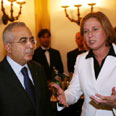
Tzipi Livni and Palestinian Prime Minister Salam Fayyad at an Iftar feast in Nazareth
צילום: איי אף פי
Ramadan fast a hot trend
Growing number of secular Muslims fast during Ramadan; Christians alarmed
Bashir Barghouti, the late secretary-general of the Communist Party in the West Bank, once told me that he and his party colleagues used to visit veteran communist leader Radwan al-Hilu (known as comrade Musa) at his home in the refugee camp of Jericho at the beginning of every Ramadan fast.
Al-Hilu, the secretary-general of the Palestine Communist Party in the 1930s, invited the leaders to a grand meal, which they purposely ate on the veranda of the house so that all the neighbors could see them. Barghouti added that every meal began with a glass of vodka. No one dared say a thing, said Barghouti, although it blatantly violated Jordanian law, which prohibited eating in public during the Ramadan fast and even imposed prison sentences on those who broke the law.
For the sake of comparison: A Jewish journalist who phoned the communist Hadash party leader Mohammad Barakeh this week, two minutes before the break of the Ramadan fast (the iftar) just a little before six in the evening, was reprimanded: "This is not the time to call. The iftar (evening meal breaking the fast) is about to commence."
It appears the Communist Party leader is not the only one who fasts during Ramadan ("I have fasted for many years," Barakeh told me,) so do many other secular Arab Israelis, including those who were raised from childhood on the Communist Party ideology. A doctor friend born in the Galilee who works in Jerusalem told me that he was raised in a typical secular home and his family always voted Rakach (New Communist List). This year he decided for the first time in his life to fast for the entire month of Ramadan. "The younger children have grown and I would like to serve as a role model," he explained. "For me it's a matter of tradition rather than religion."
More Christians join IDF
A Haifa couple, he an Arab and she a Jew, who became acquainted in the Rakach ranks, were shocked this year to discover that their two daughters decided to fast during Ramadan "to be like their friends." A building contractor from the Triangle area told me that he too fasted for the first time in his life although he and his brother "grew up in the Rakach party."
"It's good for the body to take a rest from the large amounts of food we stuff into it all year round," he explained.
In recent years groups of Israeli Arabs are undergoing a change: More and more are joining the circle of those fasting and worshiping at the mosques throughout the fast. Adjacent to a mosque in the Shuafat neighborhood in Jerusalem, traffic builds up during the noon prayer because of the hundreds of cars blocking the main road.
A friend from Shefar'am told me that this year graffiti with a quote from the Quran was sprayed on the walls saying that the fate of those who ate during the fasting hours of Ramadan was akin to challenging Allah. Although there are still a few secular "islands" of Muslims who make a point of not fasting, their numbers cannot be compared to those of 10 and 20 years ago: The fast has turned into a kind of social-fashionable trend that also attests to a nationalist affiliation.
This phenomenon is alarming Christian Israeli Arabs. A prominent figure told me this week: "It's enough to glance out of the window of my house to see the masses of worshippers flocking to prayer and blocking the roads in the area. The majority are secular before and after the Ramadan fast. Our response to this is that more and more of us are joining the IDF and the police force; others are secretly hoarding weapons to prepare for the day of order, for the eventuality that this vast Muslim energy will be directed against us."










